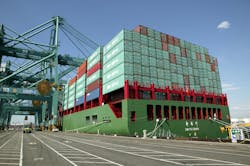California port strike widens-- but talks may be back on
A strike begun on Tuesday by clerical workers belonging to Local 63 of the International Longshore and Warehouse union at the Port of Los Angeles is not only being honored by the union’s brethren dockworkers, but has spread to the Port of Long Beach as well.
As of this morning, according to the Port of Los Angeles, seven container terminals there are “not in operation:” China Shipping (Berth 100); Yang Ming (Berths 121-131); Yusen (Berths 212-225); Evergreen (Berths 226-236); APL (Berths 302-305); APM (Berths 401-404); and California United (Berths 405-406). Only the TraPac container terminal remains open.
Meanwhile, the Port of Long Beach reported that as of last evening, three of the six container terminals at the Port are closed: Long Beach Container Terminal at Pier F, International Transportation Service at Pier G and Total Terminals International at Pier T. The three operating terminals are: SSAT at Pier A, SSAT/Matson at Pier C, and Pacific Container Terminal at Pier J.
However, at least one news report from the scene, posted online this morning by Southern California Public Radio Station KPCC 89.3, indicates that the union and the Ports are back at the negotiating table. “The union that represents hundreds of clerical workers on strike at the Ports of Los Angeles and Long Beach says it met on Thursday night with employers to negotiate a new contract,” said the news report. "We think it's a good sign," Craig Merrilees, spokesman for the International Longshore and Warehouse Union was reported to have stated. "It makes people hopeful that the employer will start addressing the outsourcing issue that has been at the core of this conflict."
According to The Wall Street Journal, negotiations broke down on Monday between the Office Clerical Unit of Local 63 and the Los Angeles/Long Beach Harbor Employers Assn, on, a group of 14 terminal operators and shipping agencies. The clerical unit's roughly 800 members in the area— which have been working without a contract since June 2010-- went on strike Tuesday at noon.
A spokesman for the ILWU told WSJ that the clerical workers are concerned their jobs are being outsourced to such places as Central America and Asia. "Automation has made it easier for companies to outsource this work," said ILWU’s Merrilees, of ILWU. "Over the years those incidents have increased and the companies have been caught red-handed over and over again."
Also per WSJ, the port employers association stated that the union’s position was a "myth" and claimed it has “offered to guarantee no workers will be laid off, among other outsourcing protections.”
The San Pedro Bay port area— covering both the Los Angeles and Long Beach ports-- moves approximately $1-billion worth of goods daily, according to Long Beach Port spokesperson Art Wong. While shipments for this holiday season have mostly cleared the port, Wong told WSJ that he was "optimistic" the next few weeks would remain busy as retail shelves would need to be restocked.
“It’s essential that both sides in this labor dispute return to the negotiating table and resolve this now,” Port of Los Angeles executive director Geraldine Knatz said, per a statement released yesterday. “We are starting to see ships divert to other ports, including to Mexico.
“This dispute has impacted not only our Port work force, but all stakeholders who ship goods through our complex and potentially the hundreds of thousands of jobs that are directly and indirectly related to port operations,” she added. “In today’s shipping environment, we can’t afford to lose cargo or our competitive advantage.”
Concerned about the nationwide impact a prolonged strike at the Ports could have, yesterday both the National Retail Federation (NRF) and the Retail Industry Leaders Association (RILA) appealed to President Obama to become involved in resolving the strike.
NRF requested that the President’s Administration “directly engage” in the labor dispute and use “all means necessary” to get the two sides negotiating
The President was urged by RILA to “step in” to resolve the strike and in doing so “consider all option, including invoking the Taft-Hartley Act, in order to restore the critical flow of commerce.”
“A prolonged strike at the nation’s largest ports would have a devastating impact on the U.S. economy,” read a letter to the President from NRF president & CEO Matthew Shay. “We call upon you to use all means necessary to get the two sides back to the negotiating table.”
NRF noted the outcome of the 2002 West Coast ports lockout, pointing out that the 10-day event “led to significant supply chain disruptions, which took six months to remedy, and cost the economy an estimated $1 billion a day.”
“An extended strike [in Los Angeles and Long Beach] this time could have a greater impact considering the fragile state of the U.S. economy,” the letter stated. “The two sides must remain at the negotiating table until a deal is reached.”
In a letter sent today, RILA president Sandy Kennedy sought the President Obama’s help with ending the strike “to prevent the significant economic damage that will otherwise result.
“As you know a strike has effectively shut down America’s two largest ports, disrupting the flow of goods and stranding cargo destined for stores and consumers across the United States,” Kennedy stated. “Without a speedy resolution, the harm caused by the shutdown will be widespread, affecting consumers, retailers and the economy at large.
“Given the enormous risk posed by a prolonged shutdown of the nation’s busiest ports, we urge you to consider all options, including invoking the Taft-Hartley Act, in order to restore the critical flow of commerce,”he continued. “We respectfully ask that you put the weight of the White House behind resolving this dispute.”
